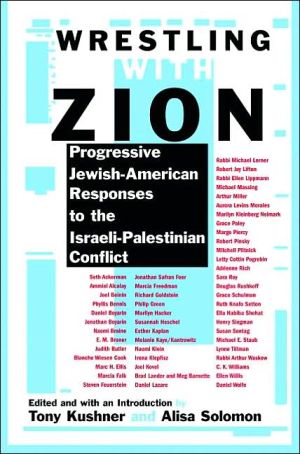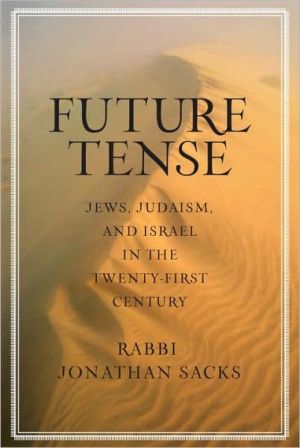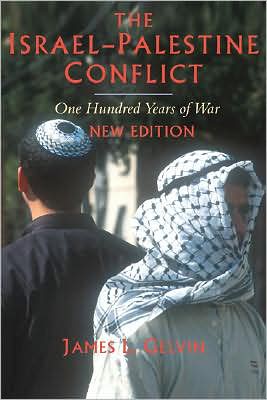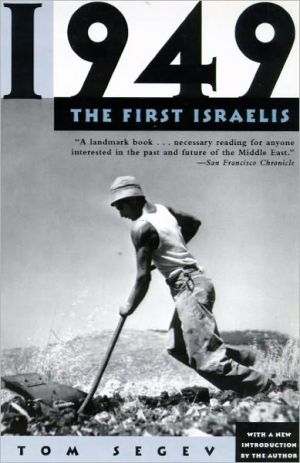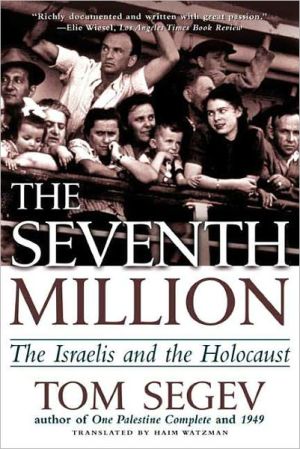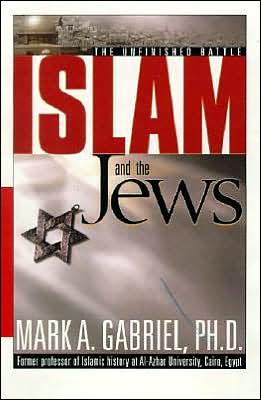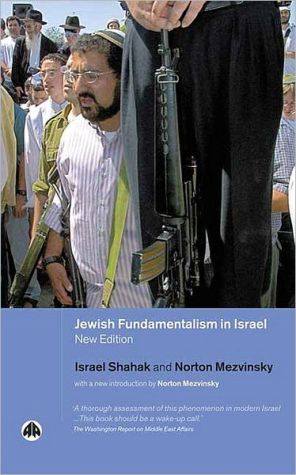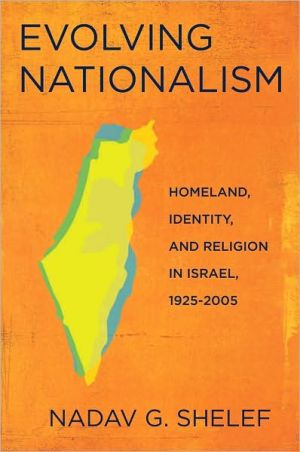Wrestling with Zion: Progressive Jewish-American Responses to the Israeli-Palestinian Conflict
As the Israeli-Palestinian conflict escalates, a dangerous illusion persists that the American Jewish community speaks with a single voice, expressing universal, uncritical support for the policies of the Sharon government. This appearance of unanimity does grave disservice to the heterogeneity of Jewish thought, and to the centuries-old Jewish traditions of lively dispute and rigorous, unapologetic skeptical inquiry. Wrestling with Zion brings together prominent poets, essayists,...
Search in google:
As the Israeli-Palestinian conflict escalates, a dangerous illusion persists that the American Jewish community speaks with a single voice, expressing universal, uncritical support for the policies of the Sharon government. This appearance of unanimity does grave disservice to the heterogeneity of Jewish thought, and to the centuries-old Jewish traditions of lively dispute and rigorous, unapologetic skeptical inquiry. Wrestling with Zion brings together prominent poets, essayists, journalists, activists, academics, novelists, and playwrights, representing the diversity of opinion in the progressive Jewish-American community regarding the Israeli-Palestinian conflict. All the participants share three things: a Jewish identity, an American identity, and a sense of urgency, refusing to ignore the catastrophic injustice that has been visited upon the Palestinian people, while at the same time being passionately committed to Jewish survival and American legacies of compassion and moral courage. The contributors — including Nathan Englander, Susan Sontag, Robert Pinsky, Daniel Wolfe, and many others — have considered certain essential questions: What is at the heart of the connection between Israel and American Jews? What is Israel's role in shaping Jewish-American identities? How has this role changed historically? And what is the history, both familiar and forgotten, of Zionism's political, cultural, and spiritual meaning? Library Journal Jonathan Safran Foer, Leon Golub, Adrienne Rich, Susan Sontag and dozens more Jewish American writers respond to the current Israeli-Palestinian conflict. Copyright 2003 Reed Business Information.
Wrestling with Zion\ Progressive Jewish-American Responses to the Israeli-Palestinian Conflict \ \ Grove Atlantic, Inc.\ Copyright © 2003 Tony Kushner and Alisa Solomon\ All right reserved.\ ISBN: 0-8021-4015-7 \ \ \ \ Chapter One\ Section One\ Zionism and Its Discontents-Historical Documents\ What We've Always Known: A Century's Sample of Dissenting Voices Marilyn Kleinberg Neimark In recent months, as violence between Israeli Jews and Palestinians raged, the range of dissent tolerated within the American Jewish community once again narrowed. Before expressing criticism, one is expected to assert one's love and support of Israel as a Jewish state. And then, if a critic is allowed a place at the table, it is certainly at the foot. There are few still alive who remember a time when, even among Zionists, debate flourished and the nature of Jewish settlement in Palestine was still a question. We want to present in this section the voices of dissenters over the course of the Zionist century, beginning with selections from Ahad Ha'am's report on his first visit to Palestine in 1891 and ending in 1982 with Henry Schwarzschild's impassioned resignation from the board of the journal Sh'ma. Today, any American Jew who would dare to express the views so freely articulated in the pieces that follow would be drummed out of the community as a traitor, an Israel-basher, a self-hating Jew. It is therefore striking to notethat most of these writers positioned themselves within Zionism and, despite their views, remained respected members of the Jewish community-albeit always criticized and, particularly after World War II, often marginalized. Despite the "Jewish-American" designation in this book's title, several of the excerpts presented here are from writers who were neither American by birth nor by domicile (Judah Magnes and I. F. Stone are the only ones born in the United States; Hannah Arendt and Albert Einstein lived out their lives in the United States). We include them to demonstrate the lucidity, directness and moral force of critical voices that are nowadays a neglected part of Jewish history. (It's unimaginable that any of these writings would today find their way into the curriculum of a standard American Hebrew school.) Occasionally, their words disappoint, reflecting the colonialist and racist attitudes of the authors' times. But most often they remind us that the trajectory of the conflict that is roiling Palestine and Israel today was clear from the very beginning for those who only would see it. Ahad Ha'am ("One of the People") was born Asher Ginsberg in the Russian Ukraine in 1856; he died in 1927 in Tel Aviv. A Hebrew essayist, he argued that "Zionism could not solve the 'problem of the Jews'-their economic, social and political plight-but it could solve 'the problem of Judaism,' i.e., assimilation" by "fostering a secular Jewish culture based on Jewish national consciousness and the renewal of Hebrew as a means of assuring the continuity of Jewish creativity." For Ahad Ha'am the Jewish community in Palestine would "serve as a 'spiritual center' nourishing Jewish life in the Diaspora." Ahad Ha'am made his first trip to Palestine in 1891. The trip was prompted by concern that the Jaffa members of the semi-secret elite order, Bnei Moshe, were mishandling land purchases for prospective immigrants and contributing to soaring land prices. Ahad Ha'am's reputation as Zionism's major internal critic has its roots in this essay, found in Kol Kitve Ahad Ha'am (The Jerusalem Publishing House, 1953.)\ A Truth from Eretz Yisrael Translated by Hilla Dayan ... We who live abroad are accustomed to believe that almost all Eretz Yisrael is now uninhabited desert and whoever wishes can buy land there as he pleases. But this is not true. It is very difficult to find in the land [ha'aretz] cultivated fields that are not used for planting. Only those sand fields or stone mountains that would require the investment of hard labor and great expense to make them good for planting remain uncultivated and that's because the Arabs do not like working too much in the present for a distant future. Therefore, it is very difficult to find good land for cattle and not only peasants, but also rich landowners, are not selling good land so easily.... We who live abroad are accustomed to believing that the Arabs are all wild desert people who, like donkeys, neither see nor understand what is happening around them. But this is a grave mistake. The Arab, like all the Semites, is sharp minded and shrewd. All the townships of Syria and Eretz Yisrael are full of Arab merchants who know how to exploit the masses and keep track of everyone with whom they deal-the same as in Europe. The Arabs, especially the urban elite, see and understand what we are doing and what we wish to do on the land, but they keep quiet and pretend not to notice anything. For now, they do not consider our actions as presenting a future danger to them. They therefore do their best to exploit us, to benefit from the newly arrived guests as much as they can and yet, in their hearts, they laugh at us. The peasants are happy when a Jewish colony is formed among them because they get better wages for their work and get richer and richer every year, as experience has shown us. The big landowners also have no problem accepting us because we pay them, for stone and sand land, amounts they would never have dreamed of getting before. But, if the time comes that our people's life in Eretz Yisrael will develop to a point where we are taking their place, either slightly or significantly, the natives are not going to just step aside so easily ... If we have this ambition to settle in a new country and radically change our way of life and we truly want to achieve our goals, then we can't ignore the fact that ahead of us is a great war and this war is going to need significant preparation.... The only one good thing about all our actions-the purchase of land-is failing because of disorder and lack of unity. He who sees how land is bought and sold in Eretz Yisrael these days never saw such a detestable and despised competition in his life. All the mongering between the shopkeepers and the petty merchants in one of those Jewish ghettos is nothing but justice and truth considering the state of affairs in Eretz Yisrael. Three months ago, when I was there, there were only two speculating companies (those who buy big chunks of land to sell them piece by piece), and even then we realized that future land speculation would be a problem for the Yishuv. Shortly after, the number of speculating companies grew alarmingly, and before I left there were already six ... and some of the newcomers, to our shame, describe themselves as "future colonialists." ... It is not our way to learn nothing for the future from the past. We must surely learn, from both our past and present history, how careful we must be not to provoke the anger of the native people by doing them wrong, how we should be cautious in our dealings with a foreign people among whom we returned to live, to handle these people with love and respect and, needless to say, with justice and good judgment. And what do our brothers do? Exactly the opposite! They were slaves in their diasporas, and suddenly they find themselves with unlimited freedom, wild freedom that only a country like Turkey can offer. This sudden change has planted despotic tendencies in their hearts, as always happens to former slaves ['eved ki yimlokh]. They deal with the Arabs with hostility and cruelty, trespass unjustly, beat them shamefully for no sufficient reason, and even boast about their actions. There is no one to stop the flood and put an end to this despicable and dangerous tendency. Our brothers indeed were right when they said that the Arab only respects he who exhibits bravery and courage. But when these people feel that the law is on their rival's side and, even more so, if they are right to think their rival's actions are unjust and oppressive, then, even if they are silent and endlessly reserved, they keep their anger in their hearts. And these people will be revengeful like no other.... If only we would have in Eretz Yisrael good, honest and healthy people, hard workers who live off their labor in peace and order. Such people would not have initially created hatred among the natives because they would not have provoked them and trespassed their borders. Even if eventually their jealousy would have turned into hate, it wouldn't have mattered because by then our brothers would have been able to strengthen their hold on the land by sheer numbers, their large and rich estates, their unity and their organized way of life. [But as long as things continue the way they are, with uncontrolled land speculation,] the society that I envision, if my dream is not just a false notion, this society will have to begin to create itself in the midst of fuss, noisiness and panic, and will have to face the prospects of both internal and external war ...\ Judah Magnes was an American Reform rabbi, born in San Francisco in 1877, whose charisma, intelligence and social connections quickly catapulted him to leadership positions in the American Jewish community. An early Zionist, Magnes resigned from the American branch of the movement in 1915 because according to Rabbi Arthur Herzberg, "neither a Jewish state nor Jewish mass political action, but his religious version of Ahad Ha-Amism-careful colonization and spiritual rebirth-seemed to him to be the meaning of Zionism." In 1917, as the United States moved toward war, Magnes "[t]o the consternation of friends and the community at large ... took up the causes of pacifism, civil liberties, and anti-imperialism." Magnes moved to Palestine in 1922, where he served as chancellor and then first president of the Hebrew University in Jerusalem from 1925 until his death. In Palestine and in Washington D.C., Magnes was a forceful advocate for a bi-national state and Arab-Jewish reconciliation. At the time of his death, in late 1948, he was arguing for an Arab-Jewish confederation. In the following letters to Chaim Weizmann and Felix Warburg, Magnes clearly articulates his views regarding Jewish policy in Palestine and relations between Jews and Arabs. "The present situation" Magnes refers to was a series of attacks by Arab rioters on Jews throughout Palestine (including massacres in Hebron and Safad). Within one week 133 Jews and 116 Arabs were dead and hundreds wounded. These letters are found in Dissenter in Zion: from the Writings of Judah L. Magnes edited by Arthur A. Goren (Harvard University Press: Cambridge, MA, 1982).\ To Chaim Weizmann London Zurich, September 7, 1929 Dear Dr. Weizmann, You asked me over the telephone last night to write you my views on the present situation. I wanted to have a long talk with you, and for that reason had been trying to get in touch with you for several days. Writing is a poor substitute for an oral exchange of opinions, and I shall try to be brief. I think that the time has come when the Jewish policy as to Palestine must be very clear, and that now only one of two policies is possible. Either the logical policy outlined by Jabotinsky in a letter in the Times which came today, basing our Jewish life in Palestine on militarism and imperialism; or a pacific policy that treats as entirely secondary such things as a "Jewish State" or a Jewish majority, or even "The Jewish National Home," and as primary the development of a Jewish spiritual, educational, moral and religious center in Palestine. The first policy has to deal primarily with politics, governments, declarations, propaganda and bayonets, and only secondarily with the Jews, and last of all with the Arabs; whereas the pacific policy has to deal first of all with the Jews, and then with the Arabs, and only incidentally with governments and all the rest. The imperialist, military and political policy is based upon mass immigration of Jews and the creation (forcible if necessary) of a Jewish majority, no matter how much this oppresses the Arabs meanwhile, or deprives them of their rights. In this kind of policy the end always justifies the means. The policy, on the other hand, of developing a Jewish spiritual Center does not depend upon mass immigration, a Jewish majority, a Jewish State, or upon depriving the Arabs (or the Jews) of their political rights for a generation or a day; but on the contrary, is desirous of having Palestine become a country of two nations and three religions, all of them having equal rights and none of them having special privileges; a country where nationalism is but the basis of internationalism, where the population is pacifistic and disarmed-in short, the Holy Land. The one policy may be termed that of militarist, imperialist, political Zionism; the other that of pacific, international, spiritual Zionism; and if some authorities will not choose to call the latter idea Zionism, then let it be called the Love of Zion, or the Return to Zion, or any other name that you will. We have been toying with the words "Jewish State," "majority," "Jewish Palestine," "politics," "Balfour Declaration," etc., long enough. It is time that we came down to realities. We have passed resolutions concerning cooperation with the Arabs, but we have done very little seriously to carry them out. I do not say that this is easy of achievement nor do I absolutely know that it is possible. The Palestine Arabs are unhappily still half savage, and their leaders are almost all small men. But this policy of cooperation is certainly more possible and more hopeful of achievement than building up a Jewish Home (National or otherwise) on bayonets and oppression. Moreover, a Jewish Home in Palestine built up on bayonets and oppression is not worth having, even though it succeed, whereas the very attempt to build it up peacefully, cooperatively, with understanding, education, and good will, is worth a great deal, even though the attempt should fail. The question is, do we want to conquer Palestine now as Joshua did in his day-with fire and sword? Or do we want to take cognizance of Jewish religious development since Joshua-our Prophets, Psalmists and Rabbis, and repeat the words: "Not by might, and not by violence, but by my spirit, saith the Lord." The question is, can any country be entered, colonized, and built up pacifistically, and can we Jews do that in the Holy Land? If we can not (and I do not say that we can rise to these heights), I for my part have lost half my interest in the enterprise. If we can not even attempt this, I should much rather see this eternal people without such a "National Home," with the wanderer's staff in hand and forming new ghettos among the peoples of the world. As you know, these are not new views on my part.\ \ Continues...\ \ \ \ Excerpted from Wrestling with Zion Copyright © 2003 by Tony Kushner and Alisa Solomon. Excerpted by permission.\ All rights reserved. No part of this excerpt may be reproduced or reprinted without permission in writing from the publisher.\ Excerpts are provided by Dial-A-Book Inc. solely for the personal use of visitors to this web site. \ \
Frontispiece: Sh'ma: From The Book of BlessingsAcknowledgmentsWrestling with Zion: An Introduction1What We've Always Known: A Century's Sample of Dissenting Voices13From "A Truth from Eretz Yisrael"14Letters to Chaim Weizmann and Felix Warburg17Our Psuedo-Samsons21From "Zionism Reconsidered"24Two Letters to the Editor of the The New York Times26From "Israel's Spiritual Climate"29From "Holy War"31On Withdrawing from Sh'ma35Morning News37The United States-Israeli Alliance41Deal Breakers51Israel and the Media: An Acquired Taste61Rescuing Private Lynch, Forgetting Rachel Corrie69The Chosen: Ideological Roots of the U.S.-Israeli Special Relationship72"Globalize the Intifada"81If We Really Care About Israel: Breira and the Limits of Dissent89Five Short EssaysA Profile of Henry Siegman106Jewish Ethics and Terrorism108It Does Concern the Diaspora110The Perils of Messianic Politics113When Oslo Finally Dies116Deal with Fundamentals117Of Dogs and Tails: The Changing Nature of the Pro-Israeli LobbyThe Unchanging Nature of the U.S.-Israeli Alliance120Wings134Jew vs. Jew: On the Jewish Civil War and the New Prophetic139Jewish Days and Nights157Why Israel Must Choose Justice166Living With the Holocaust: The Journey of a Child of Holocaust Survivors70Rally 'Round the Flag178On a Zion in the Wilderness183A Blessing to the Families of the Earth191Dislocated Identities: Reflections of an Arab-Jew195Interrogate My Love198No Return205My Patriarch Problem - and Ours221Is There Still a Jewish Question? Why I'm an Anti-Anti-Zionist226Afraid 233Immature Song Inman Square Incantation236"Anti-Semitism," Israel, and the Left243The Charge of Anti-Semitism: Jews, Israel, and the Risks of Public Critique249Sharon, Le Pen, and Anti-Semitism266Wall269The Fundamental Truth275The Law of Return279Returning the Law of Return279In Defense of the Law of Return287Roadblocks of the Soul290Utopia: An English Professor's Answer291To Our Son, Marek Alexander Barnette, on the Occasion of His Naming293Should Jews Relinquish the Right of Return? No!294Nothing Is Good for the Jews295Borders297Intifada Diptych301Next Year Where?314Ruins, Mounting toward Jerusalem323Prayer337On the Refusniks341A Profile on Dr. Robert Jay Lifton341On Courage, Truth, and Resistance344Doing Activism, Working for Peace: A Roundtable Discussion, March 9, 2003350Birkat Shalom, Blessing of Peace: From The Book of Blessings379
\ Library JournalJonathan Safran Foer, Leon Golub, Adrienne Rich, Susan Sontag and dozens more Jewish American writers respond to the current Israeli-Palestinian conflict. Copyright 2003 Reed Business Information.\ \
